At ForrestBrown, we play an important role in driving innovation in the UK. It is a bold claim, but as R&D tax relief specialists we help innovative companies recoup their R&D expenditure every day. This money then gets reinvested into more exciting projects and our clients grow.
We work closely with ambitious SMEs in disruptive tech sectors across the UK to help them scale as well as large companies looking to make the most of their investment in innovation.
By utilising government tax incentives, our aim is to move towards an even more advantageous environment where the UK’s tech economy can grow and innovation is supported at every level.
As innovation incentive experts, we understand the important role that R&D tax relief can play in funding our clients’ growth and helping them disrupt their markets. R&D tax relief as a source of funding helps established businesses grow further.
With all that in mind, we celebrate the disruptive tech sectors in the UK and highlight some of the key movers and shakers:
- AgriTech
- BioTech
- CleanTech
- EdTech
- FinTech
- FoodTech
- HealthTech
- GreenTech
- InsurTech
- MADTech / ADTech
- PropTech
- PRTech
- RetailTech
- TravelTech
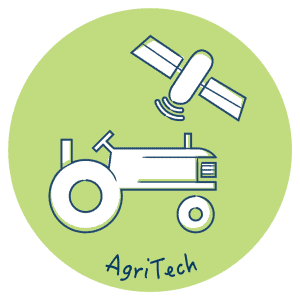
1. AgriTech
What is AgriTech?
Technology is being used to solve problems in agriculture, farming, and food production and distribution. The AgriTech sector sees scientists, technologists and engineers joining forces with start-ups and more established companies to resolve issues around waste, environmental threats, evolving consumer demands and increasingly limited resources.
AgriTech focuses in part on increasing yields while minimising input, but also looks at how new technologies – such as drones, AgriBots, LED lights and Internet of Things – can be applied to improve farming. Some companies have been looking at the development of microbial strains and molecular-based technologies to improve yields, or reduce the use of fertilisers and pesticides.
One of the most exciting areas in agriculture is big data. Everything from smart tractors to satellites are collecting data that can then be analysed at scale so that farmers can make more informed decisions. AgriTech promises further innovation in automatic irrigation, AI analysis for pest and disease prediction, soil management and other involved analytical tasks; enhanced hydroponics technology and UV soilless farming to allow year-round, vertical and urban growth of crops while navigating the effects of climate change.
The UK is on the verge of becoming a world leader in AgriTech and is an exciting area to watch as capital is being raised and government initiatives are coming to fruition. One such initiative is the Agricultural Engineering Precision Innovation Centre (Agri-EPI) to help the UK’s agri-food sector develop advanced technologies that will increase productivity and sustainability in UK agriculture.
Key areas: AgriBots | Big data | Precision farming | Specialised Microbes
Big players:
Ones to watch:
Further reading:
R&D tax credits for engineering firms

2. BioTech
What is Biotech?
Biotechnology is the use of living systems and organisms to develop or make products that help improve our lives. It covers diverse areas like gene-editing, biological-based medicines and tissue replacement.
BioTech looks to address major challenges like antibiotic resistance to finding a cure for cancer and age-related diseases. Scientists are now able to build entire genomes from scratch, allowing for research into a number of areas including disease detection. They can also build cells and organisms to fulfil a range of different purposes from biofuel to anti-malarial drugs to synthetic vanilla. Following the Covid-19 pandemic, the UK biotech is booming and is a hotbed for cutting edge innovation.
Key areas: Genes | Translational medicine | Pharmaceuticals
Big players:
Ones to watch:
Further reading:
Life Sciences and R&D – Biotech Innovation Funding
BioTech and Artificial Intelligence
Pharmaceuticals and R&D tax relief

3. CleanTech
What is CleanTech?
CleanTech is all about technologies and related business models that reduce waste and help businesses limit their negative impact on the environment. It uses emerging tech to improve products, processes and services, with a focus on sustainability.
Key areas are resource efficiency, minimising pollution and looking at alternative and renewable forms of energy like solar, wind power and biofuels. Exciting developments are taking place with fusion energy generation, hydrogen fuels, as well as ground- and air-source heating.
At the same time, energy storage is improving. When combined with energy management software, it has the potential to decentralise energy distribution and create smarter local power grids, power electric vehicle networks and reduce waste.
As well as finding ways to improve operational performance and enhance eco-efficiency, CleanTech businesses have been looking at how energy is stored, developing batteries capable of storing and transmitting renewable energy. Some companies are looking into Carbon Capture, finding methods to store and upcycle carbon emissions to reverse its negative impact. Other companies are looking at electric vehicles and big data analytics for energy monitoring.
Now more than ever, clean energy and a move towards a low carbon economy are vital as resources dwindle and energy security is more of a priority for businesses. CleanTech’s focus on high growth industries has seen it make a comeback with investors and venture capitalists.
Note: CleanTech differs from green technology in that it usually refers to the emerging financial industry rather than the actual technology in which it invests.
Key areas: BioFuels | Clean energy | Energy storage
Big players:
Ones to watch:
Further reading:

4. EdTech
What is Ed Tech?
EdTech makes use of digital technology to engage learners in new and innovative ways and reduce the cost of teaching. When schools closed their doors because of the global pandemic of 2020, EdTech became significantly more important.
Education and learning technology disrupts how education is resourced, taught and consumed. For example, it aims to improve student engagement with gamification, mobile learning apps and immersive content like video and virtual reality.
Elsewhere, big data analytics are being used to monitor individual performance and deliver personalised learning via the most effective methods. The overall learning programmes can also be improved by insights from big data.
Today, blended learning has become the norm for universities across the UK, allowing students to opt for a hybrid learning style. Online and cloud technology is enabling students of all ages to access teacher-endorsed resources, submit homework, complete eLearning as well as use social media and mobile apps for more informal learning.
There is also a raft of EdTech software and hardware that teaches kids how to code. The aim is to inspire the next generation of coders and prepare them for a very different workplace. With the introduction of Chat GPT, the ability to learn to code has been accelerated. And no doubt further improvements in AI will shake up EdTech in the future.
The UK has one of the fastest growing EdTech sectors and is set to continue to grow thanks to the EdtechUK strategic body.
Key areas: Cloud technology | Big Data | Mobile apps
Big players:
Cirrus – Cloud e-assessment platform
Ones to watch:
Further reading:
EdTech and the future of education

5. Fintech
What is Fintech?
FinTech covers all the new products, services, technologies and business models in financial services. FinTech companies aim to improve the outdated technology and solve contemporary money problems, such as lending and consumer payment.
We’ve seen mobile banking apps, digital wallets and currencies like BitCoin disrupt the financial sector. Whereas initially most FinTech was developed for the back office of financial institutions, many businesses are now selling their products directly to consumers and businesses. Artificial Intelligence customer service chatbots are now common and AI investment management is now emerging. Process automation meanwhile is already prevalent in accounting software and beyond.
London’s FinTech culture is world-leading and continues to be a hotbed of innovation. It is no wonder then that this sector continues to see sustained growth in investment.
Key areas: Payment | Peer-to-peer lending | Digital currencies | Embedded Finance
Big players:
Ones to watch:
Further reading:
The Wonderful World of Fintech and R&D
Discover our round-up of the best innovation podcasts.

6. FoodTech
What is FoodTech?
In recent years, the UK has witnessed a dramatic growth in the number of businesses that are disrupting how food is selected, preserved, processed, packaged, sold and distributed. Their aim is to improve efficiency and tackle challenges around food waste.
One of the main areas for innovation is around food processing, changing the properties of the food to improve it whether that’s in preserving it, enhancing its qualities or making it more functional. There are even businesses that are creating entirely new flavours and products by investing in molecular gastronomy.
Technology has moved on from dining experiences and is now being applied in various areas from food delivery to free-from products, big data and apps that allow consumers to make more informed choices about the food they purchase and prepare.
There has been lots of innovation recently around food that is organic, sustainable and chemical-free, everything from lab-grown meat to smart packaging. The availability and range of plant-based foods has surged and some analysts are predicting that insect-based protein may be the next big trend to watch out for.
Meanwhile, the creation of food packaging that won’t clog up the oceans has become an environmental imperative mandated by the plastic packaging tax that came into force in April 2022.
Key areas: Preservation | Processing | Free-from | Plant-based | Recycled packaging
Big players:
Ones to watch:
Further reading:
R&D in the Food & Beverage Industry
Free-From revolution & the R&D powering It
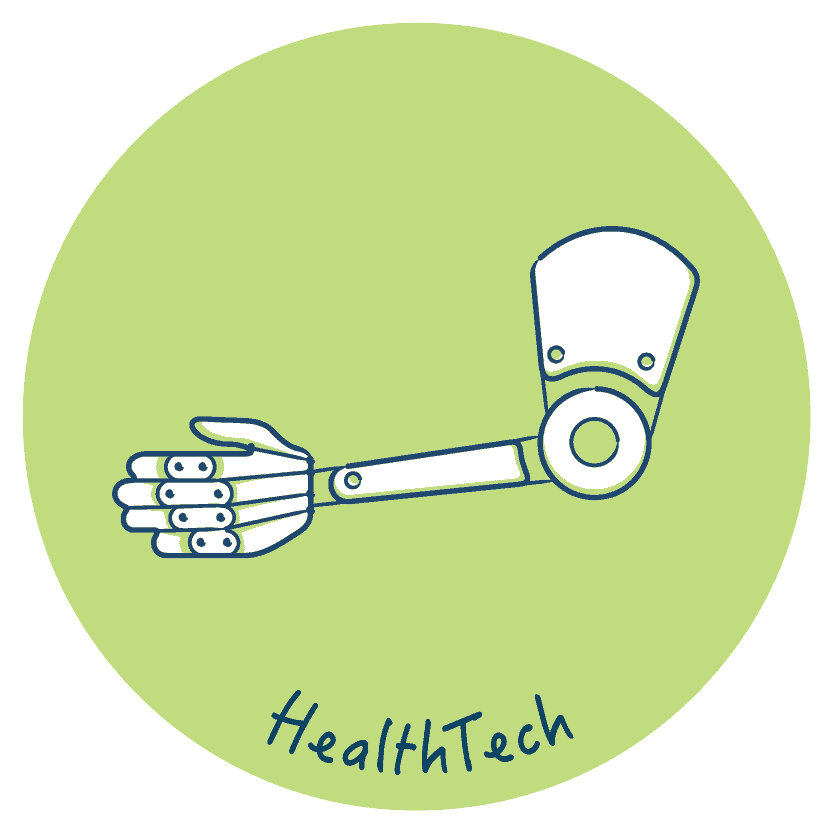
7. HealthTech
What is HealthTech?
Even before the pandemic, healthcare was being transformed by innovative companies using technology to maintain and improve health. That innovation has only increased as investment pours into biotech in an attempt to improve vaccines for Covid-19 and mitigate its associated health problems.
More broadly, HealthTech is concerned with improving overall patient care: this can be around making expensive equipment more accessible, investing in biomedecine right down to improving how records are organised and how appointments are made. Big data analysis is a key focus too, being used to prevent diseases, predict flu outbreaks and cut medical costs. As well as this, disruptive technology is enabling people to take control and responsibility for elements of their own care and live healthier lives.
Despite regulatory challenges and difficulties around adoption of the new tech within the healthcare system, the HealthTech sector is booming and has an essential role to play in the future of the NHS.
Key areas: BioMedecine | Big data | Robotics
Big players:
Ones to watch:
Further reading:
New strategy to boost NHS access to innovative medical technology
Can we fix the UK healthtech funding gap?
Worldwide healthtech growth: how the UK and Scotland are positioned

8. GreenTech
What is GreenTech?
Similar to CleanTech, this sector focuses on technology that reduces the negative impact we have on the environment. It looks at renewable and alternative energy production, recycling and covers everything from longer-lasting light bulbs to generating electricity from plants.
The GreenTech sector has attracted socially-conscious investors and will continue to attract interest as global warming and diminishing natural resources make it essential to find alternatives to fossil fuels.
Key Areas: BioFuel | Renewable energy | Batteries
Ones to watch:
Further reading:
R&D tax relief for the renewables sector

9.InsurTech
What is InsurTech?
The insurance market has been transformed by digital technology and the innovative businesses operating in the InsurTech space.
InsurTech innovators aim to empower the consumer by delivering insight into their risk and providing tailored and cheaper insurance. Insurance providers are also utilising technologies to help them add value to the consumer, build brand loyalty, as well as identify and capitalise on new revenue streams. Motor insurers, for example, can receive real-time, sensor-sourced customer data and analytics to improve their offering.
There are others that leverage the Internet of Things and big data to deliver value for consumers, businesses and insurers. Data gathered from wearables, vehicles and other insured commercial assets like plant and factory machinery can allow for individualised underwriting and more tailored policies.
Improving Insurance management software is a focus of some companies, allowing individuals to manage their insurance claims online.
Key areas: MicroInsurance | Connected risk management | Asset monitoring | RegTech
Big players:
All the major insurers (from AXA to Zurich) are investing and/or operating InsurTech offerings.
Ones to watch:
Further reading:
Claiming R&D tax relief in the insurance sector
Insurance companies are cautiously optimistic that exoskeletons can reduce injury and claims

10. MADTech / ADTech
What is MADTech?
MADTech is the coming together of marketing, advertising and technology. It is a major growth area for tech where fresh marketing perspectives and strategies combine to tackle issues around selling to a disengaged and intolerant audience.
Agencies and app and software developers are using emerging technologies and big data to engage with consumers in ways that can add value and ultimately be more meaningful. There are also those building tools and services to accelerate publisher revenue in a dramatically different online landscape. The dawn of a cookieless internet means that tech solutions for understanding online behaviours are more important than ever.
With new technologies having the ability to disrupt the marketing landscape, it is an exciting area for investors and VCs.
Key areas: Predictive analytics | Geo-Targeting | Virtual Reality | Augmented Reality
Big players:
Ones to watch:
Further reading:
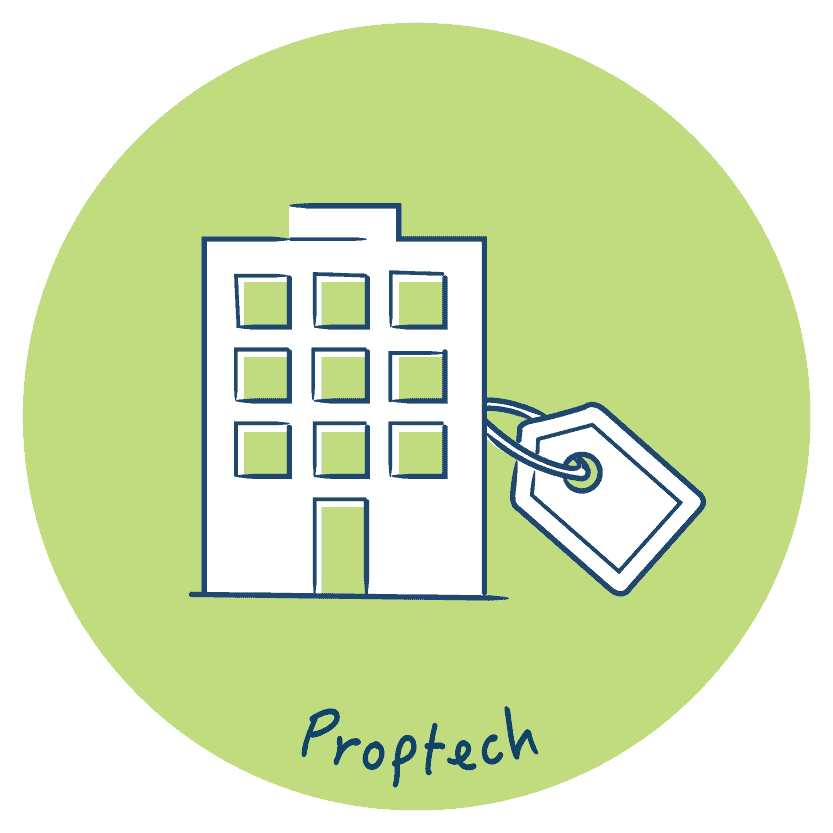
11. PropTech
What is PropTech?
The property sector, both commercial and residential, has been held back by inefficient and ultimately unhelpful processes. UK Proptech companies are all about solving problems around the buying and selling process and making the model more efficient and cost-effective for all involved.
A common aim is to improve the experience for the consumer through increased automation and providing them with better results via a deeper understanding of their needs. Some of the key areas are around improving consumers’ access to mortgages, finding new valuations, and selling or renting property.
London has become one of the central hubs for PropTech with start-ups seeing early-stage investments. Investment is expected to increase as more estate agents embrace PropTech.
Key Areas: Smart buildings (IOT) | Peer-to-peer | Data Aggregation
Big players:
Zoopla
Ones to watch:
Further reading:
PropTech Market Size to be Worth $94,200.07 Million by 2030: Grand View Research, Inc.
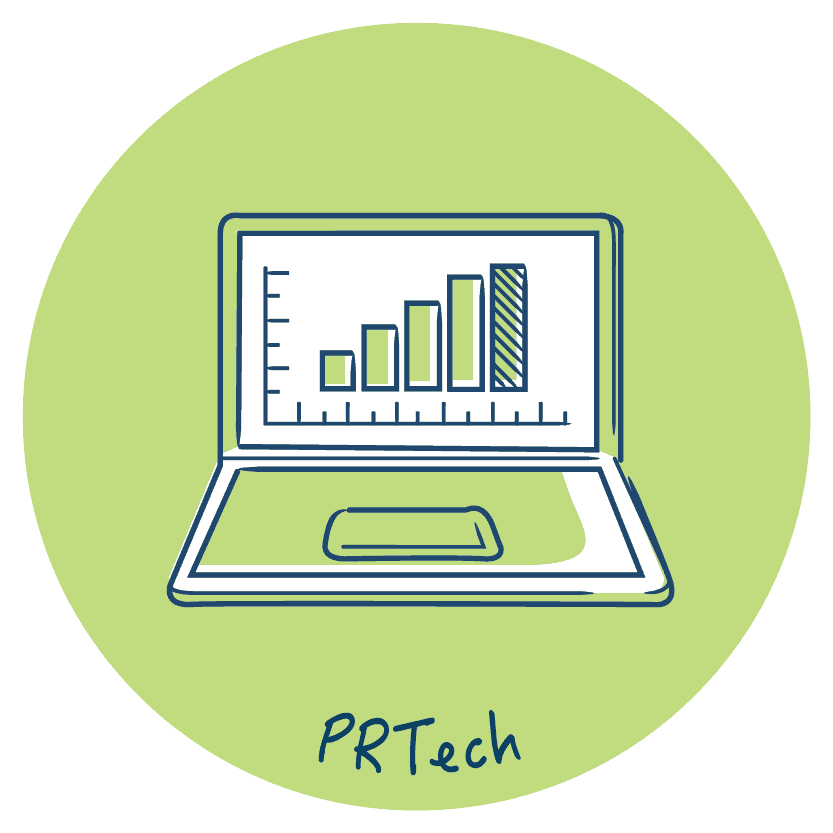
12. PRTech
What is PRTech?
With the entire marketing world transformed by technology, PR is now looking to adopt a more programmatic, data-driven approach. Guesswork and observed data is no longer sufficient for businesses when it comes to measuring the success of a PR campaign.
PRTech covers everything from retargeting solutions to newswires to analytics to publishing platforms themselves. It looks at better connecting journalists with PRs, more intelligent press release targeting and cross-platform content distribution. Data is also being used to make PR activities better optimised, providing insights into what works and why. Data is now driving the key decisions and allowing agencies and businesses to see what is effective in terms of content and messaging.
Keys areas: Big Data | PR Analytics | Content Retargeting
Big players:
Ones to watch:
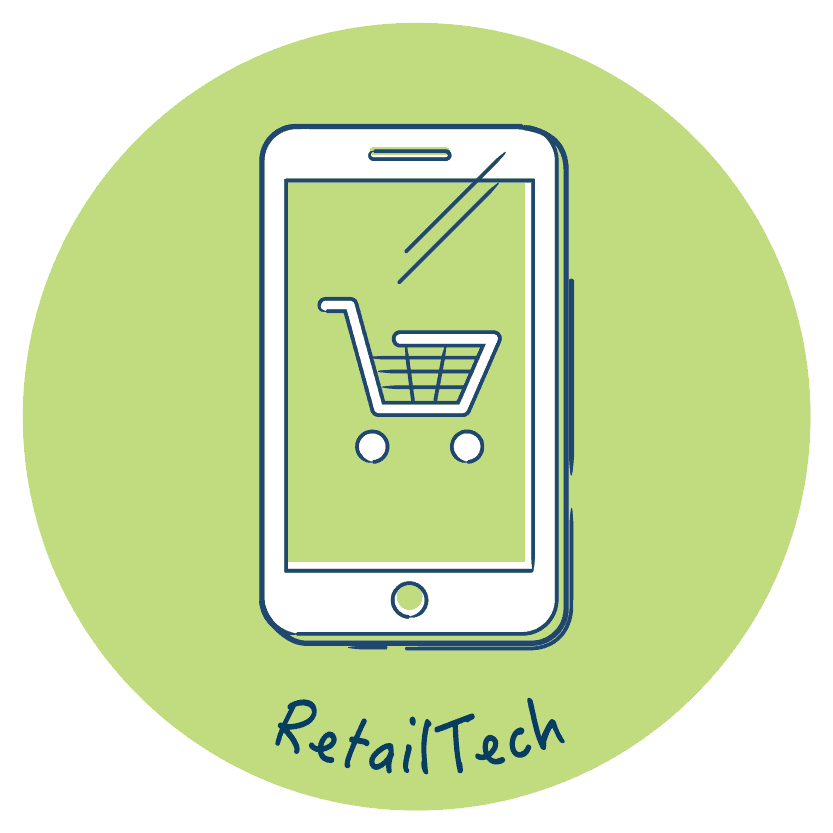
13. RetailTech
What is RetailTech?
Of all sectors, retail has been hardest hit by the pandemic. But innovative UK retail businesses are using the latest digital technology to weather the storm.
One of the primary areas within RetailTech is around tightening the connection between online and physical retail, linking ‘bricks and clicks’. This includes using RFID (Radio Frequency Identification) and beacon technology to serve personalised messages and information to shoppers in-store. Other RetailTech businesses are using virtual presence – that is virtual reality (VR) and augmented reality (AR) to deliver an online or app experience that better correlates to an in-store experience.
Many retail and eCommerce businesses are looking for deeper insights into the customer journey across all channels so that they can improve the customer experience and make their marketing more targeted. Creating a genuinely omnichannel experience is a primary goal of many retailers and a focus for RetailTech.
The field of payments, in particular ‘cashless’ transactions, is also a key focus with biometric technology, like iris scanning and facial recognition, being used to improve security around payment.
There are many exciting businesses operating in the UK’s retail technology sector.
Key areas: Wearables (RFID/Beacon) | Payments | Biometrics | VR | AR | 5G | Experiential retail
Big players:
Ones to watch:
Further reading:

14. Traveltech
What is TravelTech?
The travel technology industry looks at reducing the cost, complexity and environmental impact of travel as well as delivering better experiences for travellers at each stage of their journey.
Innovators in travel and tourism are developing technologies to help connect consumers and travel providers, offering more choice and more affordable options in real-time. Air BnB, Uber and Kayak have all dramatically changed the way we approach travel and new start-ups continue to disrupt the sector.
Tech is being developed around mobile bookings, user ratings and reviews, tours, expense management and predictive analytics platforms. There are also apps that unlock more authentic ‘local’ experiences with events and activities.
TravelTech is at a key point in its development, with exciting and innovative start-ups entering the space all the time. There are also existing successful start-ups that are rapidly growing and looking to acquire smaller start-ups to grow further still. As the TravelTech landscape continues to evolve, it presents exciting opportunities for investors.
Key areas: Mobile Booking | Predictive Analytics | IoT
Big players:
Ones to watch:
Travel Perk (Formerly Click Travel)
Further reading:
Tech Developments in Travel & Tourism
ForrestBrown – helping innovative businesses grow
As R&D tax relief specialists, ForrestBrown help innovative businesses fund their growth and disrupt their chosen markets via government tax incentives. To find out more about how we can work with your business, give us a call today.

